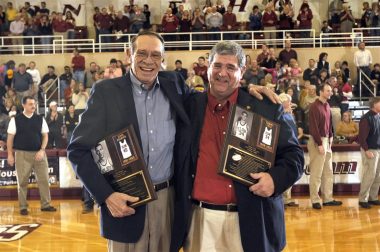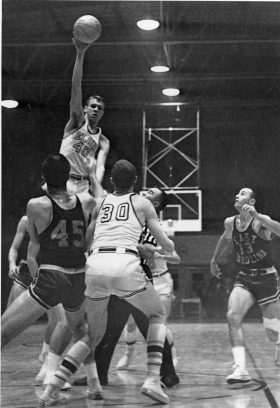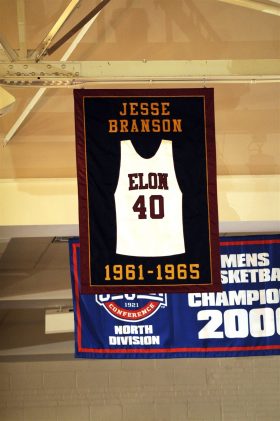Branson sets a benchmark for Elon basketball. This story is part of the magazine's coverage of 100 years of Elon basketball.

By Kristin Simonetti ’05
There’s a old story about Jesse Branson ’65 that involves a video camera, the top of a basketball backboard and a quarter.
“Actually,” Branson interjects, “it was a 50-cent piece.”
Early in the 1964-1965 Elon basketball season, a teammate challenged the 6-foot-7 Branson to jump and grab a coin from the top of the backboard, nearly 13 feet off the ground. Branson, a prolific rebounder, replied, “OK.” With his teammate videotaping, Branson went airborne, snatching the coin on the first try.

“I’d never done it before,” Branson recalls, “and I’ve never done it since.”
Branson’s combination of size and athletic ability propelled him to an outstanding career in basketball at Elon, a career that remains a benchmark for the university’s basketball program. From 1961-1965, Branson set 17 individual records, 11 of which stand today, including the most points scored in a career with 2,241.
“Jesse was an outstanding player,” says Bill Morningstar ’64, a teammate of Branson’s from 1961 to 1964 and current head coach of the men’s golf team. “He was a go-to player who could do it all. When you had Jesse on the team, you knew you could win.”

Big fish in small pond
When deciding where to attend college, Branson concedes that Elon wasn’t exactly his first choice.
Branson, a Graham, N.C., native, received scholarship offers from several larger schools and was recruited out of high school by Frank McGuire, the renowned coach at the University of North Carolina. Branson planned to play for the Tar Heels, but McGuire left UNC after the 1960-1961 season, and incoming Tar Heels coach Dean Smith didn’t extend Branson a scholarship.
With little time left to decide where to go, Branson received and accepted an offer to play for Elon head coach Bill Miller. Branson shined in his freshman season at Elon, averaging more than 14 points per game. His achievements garnered the attention of UNC’s Smith, who after Branson’s first season offered him a scholarship.
Branson turned him down.
He says he’d grown to appreciate the “smallness” of Elon. He fondly recalls being able to walk into then-President Earl Danieley’s office to sit and talk about anything. He remembers the camaraderie of the students and professors. Elon also is where he met Barbara Tillman, a fellow business major whom he would marry before the two graduated in 1965.
Staying at Elon turned out to be a great decision for Branson. In addition to the several individual Elon records he set, Branson earned a spot on the All-Carolinas Conference team four times, won conference MVP honors in 1965 when the Fighting Christians won the conference tournament, and twice was named an NAIA All-American (1964, 1965).
Branson’s accomplishments on the basketball court did not go unnoticed by professional coaches and scouts. The Philadelphia 76ers chose Branson in the second round of the 1965 National Basketball Association draft.
A brush with greatness
“I’d never thought about being drafted,” Branson recalls. “The first time I actually thought about it was right before the draft happened.”
Branson joined a loaded 76ers team that featured stars Wilt Chamberlain, Luke Jackson and Chet Walker. Because of the intense competition for jobs in the NBA — there were only 12 teams, with 12 players on each team — Branson recalls that many of the veteran players on the team were less than friendly to a newcomer. But Chamberlain and Jackson weren’t among them.
“Others on the team didn’t accept rookies very well, they were very protective of their jobs,” Branson says. “Wilt and I got along super good. He was a great guy to be around.”
The 76ers had a successful 1965-1966 season that ended in an Eastern Conference finals loss to Bill Russell and John Havlicek’s Boston Celtics, the eventual NBA champions. Branson played in just five games that year, and afterward decided to move on to another team.
After sitting out the 1966-1967 season because of back problems, he joined the American Basketball Association’s New Orleans Buccaneers, where he played alongside teammate Larry Brown, a member of the National Basketball Hall of Fame and current Charlotte Bobcats head coach. Branson played in 78 games for the Buccaneers, who reached the ABA finals in the 1967-1968 season. He scored 1,086 points, averaging 11 points per game in the playoffs, but constant back problems forced him to leave basketball behind for good at season’s end.
Going home
Branson and Barbara returned to North Carolina and raised their three children, Brian, Kristi and Wendi, in Alamance County. Brian and Kristi graduated from Elon, in 1987 and 1993, respectively. Wendi is a graduate of North Carolina State University.
Brian Branson also starred on Elon’s basketball team, earning Carolinas Conference MVP and Academic All-American of the Year honors in 1988. His achievements earned him a spot along with his father in the Elon Sports Hall of Fame, making them the only father-son tandem to be inducted. Jesse Branson says he enjoyed being able to watch his son follow in his footsteps as an Elon student-athlete, even though it wasn’t always easy.
“I never was nervous when I played,” Jesse says, “but I sat on pins and needles every minute of each of his games.”
Brian and Jesse Branson’s roles reversed a bit on Feb. 7, when Brian and several family members sat in Alumni Gym while Jesse stood at midcourt. During a special halftime ceremony at the Elon vs. Appalachian State men’s basketball game, Elon retired the jerseys of Branson and Tommy Cole ’72, regarded as the best players in the 100 seasons of the basketball program. Talking about his jersey retirement, Branson deflects praise, choosing instead to credit his teammates.
“Everyone had a part in it,” he says. “My teammates made me a good player. It was a great experience playing with them.”
But it is Branson whom most Elon alumni and fans from the 1960s remember. More than 40 years after his playing days, Branson says, he continues to be associated with the university and the team.
“I still have people, even from outside of Elon, come up and talk to me about my career and about basketball,” he says.
No doubt a couple of them ask Branson about the story involving a coin, a backboard and his once-in-a-lifetime leap.


